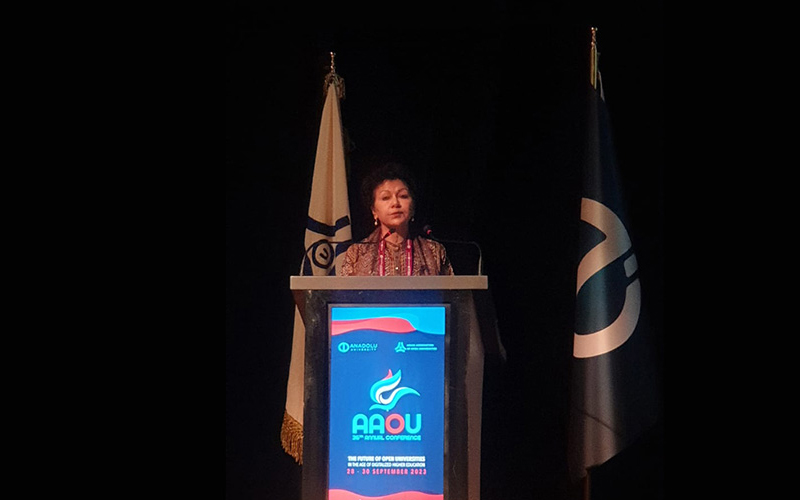
Professor Asha Kanwar, President and CEO of COL, has presented a keynote address to the 36th Asian Association of Open Universities Annual Conference (AAOU 2023) in Istanbul, Turkey, on 28 September 2023 and hosted by Anadolu University Open Education System (OES).
Under the theme of the ‘Future of Open Universities: A Comprehensive Overview’, Professor Kanwar began her address with a nod to the past by acknowledging the growth and development of open universities, tracing their origins back to the 18th and 19th centuries with the University of South Africa (UNISA) – considered the first open university offering distance learning in 1946.
The President explained how open universities have contributed to national development and have enhanced access to higher education, most notably for marginalised communities and persons with disabilities. She also discussed within a global context how higher education, particularly in relation to Sustainable Development Goal 4 (SDG 4), aims to ensure inclusive and equitable quality education.
The rapidly increasing role of artificial intelligence (AI) in education was highlighted, including its potential to improve productivity, reduce costs and support personalised learning. However, the digital divide remains a challenge, with presently only 40 per cent internet connectivity in Sub-Saharan Africa. She commented on the acceleration in the development of AI and its effect on education and open and distance learning, in particular:
“Developments in AI over the last few months have generated expectations that this might be the breakthrough the education sector is looking for. AI is promising – (it) can help institutions raise productivity, reduce costs, develop assessments and support credit transfers.”
Professor Kanwar noted a worrisome decline in student numbers in open universities in Commonwealth countries, from 4.4 million to 3.4 million, possibly due, in part, to increased competition. The integral role of open educational resources (OER) and micro-credentials in the current educational landscape was mentioned.
Five future pathways for open universities to take were also outlined – promoting a culture of lifelong learning, personalising learning through technological innovations, collaborating with the labour market for job-specific courses, integrating multiple literacies into curricula and addressing environmental sustainability.
In closing, Professor Kanwar reflected on how the future of open universities will require international collaborative effort:
“The time has come for us to claim our rightful place as leaders in the education sector. Leadership at all levels will be key. We need to reflect on and question our fundamentals. Does access to education diminish inequality? Are we contributing to a world where everyone is free to learn? How will leaders in open universities ensure the quality of open education that is affordable and accessible for all? These are big goals that cannot be achieved alone.”


